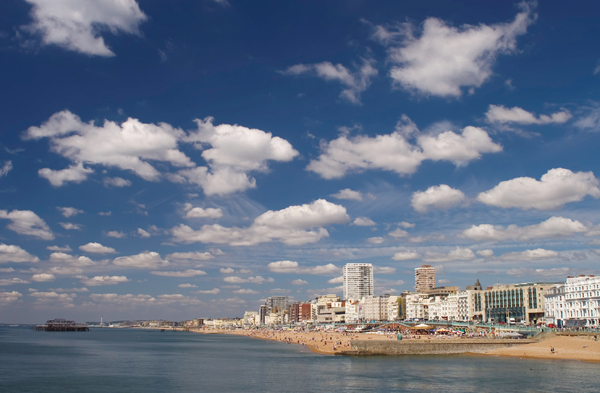The makings of a recover
As the government shuts 27 Remploy factories Frank le Duc finds a contrasting picture in Hove

Less than three weeks from now 27 Remploy factories employing disabled people will start closing around the country with the loss of 1,400 jobs. Last Thursday many of those staff took part in a second strike. They are unhappy about the loss of their jobs and the terms of their redundancy. The government said that the factories were loss-making and unaffordable at a time of austerity. Nine other factories look like being sold and have viable business plans. No-one is pretending that it will be easy for those disabled staff to find new jobs. There are concerns that most will end up on benefits paid by a different arm of the state.
There is a factory in Hove which, like Remploy, employs disabled people and had the threat of closure hanging over it for a long time. The old Castleham factory has been providing supported employment for nearly 25 years at the Knoll Business Centre in Old Shoreham Road. It too made a loss, meaning that the council had to subsidise it or close it down.
Last September the council appointed Jeff White as business development manager. He was given a tough brief: find a way forward within three months or close the operation. Mr White, 58, has worked in business development for Cable and Wireless and other big corporations. He has run his own business and worked as a coach and mentor. But this small factory close to Hove Cemetery has become something of a mission.
He said: “I was given three months to come up with a viable business plan. We put together three business plans – and eventually one got accepted. There was a lot of older equipment and a lot of people not doing any work. The bottom line was if we want this to work then we’re going to have to invest. It’s expensive, we’ve had to make big investments in equipment that’s going to make us money. That’s one of the things that’s helped change things.
ABLE AND WILLING
“Since April we’ve been trading as ableandwilling. Our turnover has to increase and so does our profit. Before, all we had to do was keep people busy. Over the past three months we’ve been on track but our targets are really aggressive. Our skills are embroidery, a whole series of printing, and assembly and packaging. We’ve won work – in the past three months we’ve done a whole series of embroidery work for about 30 cricket clubs. We won that work because we can turn it around at the price and the speed they want.
“We’re a supported employer. We have a target of employing people with disabilities so they make up 50 per cent of our people. On the shop floor it’s 100 per cent. With us included [the senior management] it’s 90 per cent – that’s amazing. Working in this crappy little cabin on the Knoll Estate is the best job I’ve ever had. I work with such fantastic people. We’ve tried very hard to make it a fun place to work. In these times of difficulty for Remploy, we’re a great model of how you can do things.”
Mr White said that Able and Willing had enjoyed support from the departing council chief executive John Barradell. He said that Mr Barradell had been challenging and tough about producing a rigorous business case but a source of practical help and advice. And he said that former council leader Bill Randall, currently serving as mayor, had also been another great supporter. Councillor Randall was great at spreading the word. He said that both had lent their networking skills as the factory went in search of new orders. And new leader Jason Kitcat, formerly in charge of the council finances, had proved supportive too. Amid a roll call of local backers were the likes of Albion in the Community, Legal and General, the Martlets Hospice and Mears, the council’s housing contractor.
After a visit nearly three years ago, Mary Mears, a former leader of the council, said: “I was extremely impressed with the work that they are doing and am delighted that the council is able to support the enterprise. Helping those with disabilities into employment is one of those unsung council functions which rarely hits the headlines but which provides an incredibly valuable service for some of our most
vulnerable residents.”
Political backing is one thing. But given the financial climate Mr White and his team are under pressure to provide not just supported employment but to do so profitably. So as well as new equipment, Mr White has brought in new work practices and trained staff in new skills. He has also brought three new staff on board – the first in ten years. They are on six-month contracts and will be using their time to develop their skills and build their confidence as they look for work elsewhere in the local economy. Changing work practices are the sort of issue that often spurs union involvement – and the GMB locally has taken an interest in the factory. Its conclusion can be a source of some satisfaction.
A SHINING EXAMPLE
Lynne Henshaw, the GMB representative, said: “The changes have been absolutely tremendous. There are 22 disabled people, they’re a lovely set of people. The threat of closing down had been hanging over them for a very long time. It’s a shining example of what can be achieved if there’s innovation and commitment from all sides. It’s a contrast to the situation at Remploy. The tragic consequences of making 1,400 disabled people unemployed makes my heart sink. I’m happy Able and Willing is becoming a viable business and a long-term prospect.”
A familiar face around the factory is Lyn Lynch, from the council’s Supported Employment Team, which helps people with disabilities and long-term health needs. She said: “We support people to learn their jobs and stay in work and we help companies with disability issues. A lot of the adjustments can be so small but people don’t actually think of them. One man had a hearing impairment and his desk faced the wall. People always had to come up and tap him to get his attention. We got the desk turned round. We had a lady who worked as an admin assistant. She had limited use of one arm so we got her keyboard adjusted.”
She said that the hospital, local supermarkets and care homes such as Birch Grove in Stanford Avenue, Brighton, had been good at recruiting the people she helped. She and her colleagues run courses to help people find jobs in the care sector and as cleaners. Looking back over the past few months at Able and Willing, she said: “Change is very difficult for anyone but more so for our folk. Everyone’s stepped up to the mark.”
Mr White said that the changes had seen companies like Imex, the conference organiser based in Hove, place orders. He was adamant that his staff must be able to compete on price and quality. If there was any initial hesitancy it disappeared when the first job was delivered on time and in budget. “They couldn’t have been happier,” he said of his client. And as he beamed about the new machinery and a display case brimming with samples of signs, mugs, t-shirts and other printed and embroidered goods produced by his staff, he added: “This extraordinary place gives them the dignity of work.”
JOHN’S STORY
John Dean, 55, from Moulsecoomb, is a team leader at ableandwilling. He worked as a chandelier maker when he left school. When the business struggled, he was one of those who lost his job. He said: “I fitted chandeliers before I found out about my disability. I’ve got ankylosing spondylitis. It’s a condition where your spine fuses. I try not to let it affect me and I never use it as an excuse.”
While he was on the dole he was asked to go for training in Portsmouth which, despite the commute, he did. He said: “The travelling was a bit awkward at times. I think they wanted me to prove I wanted to work. After that, they offered me a chance to come to Castleham. I had a trial period, it’s lasted 28 years. I started off as a humble assembler on the shop floor. I became a charge hand – and now it’s called team leader.”
Mr Dean, who is also a member of the council’s Disabled Workers Forum, said: “If I can, then I’ll work. Having a disability does restrict the type of work you can do. You have to accept you’ve got a disability and then just get on with life. They’re a good bunch here and they do a good day’s work.
“We were almost going out of business but the future looks bright now. I’ve probably gone through all the emotions you can think of. But now it’s a breath of fresh air.”





















